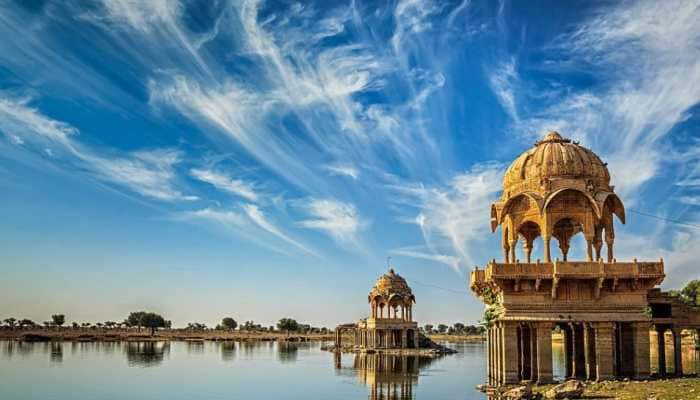DSDS 2013 can show a sustainable way to the world: RK Pachauri
TERI is holding its flagship global conference, the Delhi Sustainable Development Summit (DSDS), in January 2013.
Trending Photos
)
 TERI, one of India’s top research organisations, is holding its flagship global conference, the Delhi Sustainable Development Summit (DSDS) in January 2013. TERI Director-General Dr RK Pachauri talked to OneWorld South Asia`s Rahul Kumar about his expectations from the summit.
Excerpts from the interview:
OWSA: Talking about the Delhi Sustainable Development Summit, it has been 12 years since it started? How do you think it has contributed to a global discourse on sustainable development?
Dr Pachauri: I think it is important for us to have an informed discussion and debate on the question of understanding sustainable development and what it represents and then coming up with strategies by which we are able to achieve a pattern which could be called sustainable. For that you need to get the best minds and the best leaders from all over the world, those who can shed light on these issues in a manner that can inform the public at large. It is for this reason that we carry out this high-level of informed debate and discussion during the DSDS but we also try to spread the message through various channels and disseminate whatever comes out of the summit.
I think the DSDS is truly a multi-stakeholder kind of exercise and a powerful platform since we are able to get a number of world leaders and ministers dealing with various aspects of sustainable development; business and industry, research and academia as well as the civil society. I think you really need this kind of combination to make a dent on the problem, which currently is a pattern of development that is not sustainable.
OWSA: The DSDS 2012 was on ‘Protecting the Global Commons’ and was sandwiched between a number of global meets. Did it feed into some of the international meets?
Dr Pachauri: I think there are two ways of how one could view the issue. Yes whatever came out of our summit certainly had some inputs for Rio+20 and other events that have taken place during the course of the year. But more importantly, we were able to inform several of the players who had an influence in the Rio+20 discussions, just because a good number of them were present here during the summit. So, when they went into the exercise for Rio+20, they were better informed and better prepared to be able be to make a difference.
So, I must say that we have been able to make a difference along these lines, but I must confess that really speaking we are dealing with inertia which is not going to be easy to change. Therefore, I don’t think we can say that it was in any way a resounding impact that we had, but within the realms of what is possible yes, I think we had significant impact.
OWSA: You mention governments, the business, civil society and even the people as the audience for the DSDS. Now which one of these do you think will actually break that inertia and propel the world to a more sustainable way of living and thinking?
Dr Pachauri: I will not single out any particular section of this audience that we get at the DSDS. You certainly need government because they need to take initiative in terms of policy, regulations and legislation. You need business because a large part of the global activity is in the hands of business. If business does not see the benefit of sustainability then clearly you are missing out on a large part of the action that really would give sustainability the outcome that you are looking for. And research and academia because they need to come up with ideas, analysis and articulation of choices therefore they must be a part of the action that has to take place. And civil society so that you must mobilise people at the grassroots and that only civil society can do that effectively.
OWSA: The theme for the upcoming DSDS is ‘The Global Challenge of Resource Efficient and Low Carbon Development’. How easy or challenging is it in a world mesmerised by growth to achieve low carbon development?
Dr Pachauri: The truth is that when we are facing some challenges in economic growth that is really the appropriate moment when we should look at different options and choices we have before us. And one choice that clearly has not been explored adequately is in terms of what constitutes green growth. And may I say that even in the Rio+20 Summit the green economy and green growth and development received a great deal of attention. Therefore, we feel that DSDS 2013 if devoted to this subject can perhaps articulate for the world what the opportunities, choices and solutions are for bringing about resource efficient and low carbon development.
We felt it was timely, very relevant and we felt that this would also be the occasion when we can define the pattern of development that hopefully will bring about economic development but do it in a manner that imposes the least impact on the environment, imposes the least on resource intensity and therefore would be something that would be sustainable.
OWSA: If the world does embraces sustainable development and growth, do you think it would be out of fear or out of wisdom?
Dr Pachauri: I think it has to be out of enlightened long-term self interest because it is in the self-interest of human society to see that we don’t create conditions by which we make it impossible or very difficult for generations yet to come to be able to lead dignified and a satisfactory level of well being.
It should be something that reflects long term self interest on the part of human society. It clearly is no longer an option that we continue with business as usual. Because if we do, then we are going to create such a pressure on the eco-system of the planet and on the natural resources that we clearly will not find that sustainable. I find that this is a moment when we should pause and see where our interest lies. It seems to me that our interest clearly lies in pursuing a path of development that is low in resource intensity, that is low in carbon emissions, and yet gives us opportunities for regenerating employment for regenerating economic activity. To me, therefore, this seems like an approach that is clearly in the interests of society and therefore if we adopt it, it should be purely for that reason and there should be no element of fear involved because there is nothing to fear except ourselves and our own actions.
OWSA: Where do you see India stand amidst all this din over sustainable development and growth?
Dr Pachauri: To be honest, I get the sense that India will have to articulate its stand a little more clearly because one gets confusing signals. On the one hand, we seem to shun, in several forums, negotiations on this general subject. On the other hand, if we look at our domestic situation, we cannot possibly continue consuming natural resources impacting our eco-systems in the manner that we are doing because with the growing population, if everybody is going to aspire to lifestyle and standards of living that the richest sections of the society have become accustomed to, then we would obviously be imposing a very huge burden on our own natural resources. To my mind it seems that India has to articulate its position based on self interest which lies in moving to a greener path of economic development and that our policies clearly make a break from the past because if we continue with business as usual, we will have some very serious difficulties in the future.
OWSA: DSDS attracts the finest of the brains from the various sections of the society. What is your message to the participants of DSDS 2013?
Dr Pachauri: To come fully prepared. To be frank, open and fearless in their expression of opinions and to also go back with very clear thought on how the messages that we get out of DSDS 2013 can be translated into action. Because we get 1,000 plus people and these are people who can influence action and decisions whenever they go back and wherever they might be. I think it would be very important for them to not only discuss and debate the issues on the agenda while they are here but also that these are translated into action when they go back. This way they would be able to spread the message of DSDS 2013 and convert it into action which will provide an example for the rest of the world on how we might be able to align our policies to attain resource efficient low carbon growth.
TERI, one of India’s top research organisations, is holding its flagship global conference, the Delhi Sustainable Development Summit (DSDS) in January 2013. TERI Director-General Dr RK Pachauri talked to OneWorld South Asia`s Rahul Kumar about his expectations from the summit.
Excerpts from the interview:
OWSA: Talking about the Delhi Sustainable Development Summit, it has been 12 years since it started? How do you think it has contributed to a global discourse on sustainable development?
Dr Pachauri: I think it is important for us to have an informed discussion and debate on the question of understanding sustainable development and what it represents and then coming up with strategies by which we are able to achieve a pattern which could be called sustainable. For that you need to get the best minds and the best leaders from all over the world, those who can shed light on these issues in a manner that can inform the public at large. It is for this reason that we carry out this high-level of informed debate and discussion during the DSDS but we also try to spread the message through various channels and disseminate whatever comes out of the summit.
I think the DSDS is truly a multi-stakeholder kind of exercise and a powerful platform since we are able to get a number of world leaders and ministers dealing with various aspects of sustainable development; business and industry, research and academia as well as the civil society. I think you really need this kind of combination to make a dent on the problem, which currently is a pattern of development that is not sustainable.
OWSA: The DSDS 2012 was on ‘Protecting the Global Commons’ and was sandwiched between a number of global meets. Did it feed into some of the international meets?
Dr Pachauri: I think there are two ways of how one could view the issue. Yes whatever came out of our summit certainly had some inputs for Rio+20 and other events that have taken place during the course of the year. But more importantly, we were able to inform several of the players who had an influence in the Rio+20 discussions, just because a good number of them were present here during the summit. So, when they went into the exercise for Rio+20, they were better informed and better prepared to be able be to make a difference.
So, I must say that we have been able to make a difference along these lines, but I must confess that really speaking we are dealing with inertia which is not going to be easy to change. Therefore, I don’t think we can say that it was in any way a resounding impact that we had, but within the realms of what is possible yes, I think we had significant impact.
OWSA: You mention governments, the business, civil society and even the people as the audience for the DSDS. Now which one of these do you think will actually break that inertia and propel the world to a more sustainable way of living and thinking?
Dr Pachauri: I will not single out any particular section of this audience that we get at the DSDS. You certainly need government because they need to take initiative in terms of policy, regulations and legislation. You need business because a large part of the global activity is in the hands of business. If business does not see the benefit of sustainability then clearly you are missing out on a large part of the action that really would give sustainability the outcome that you are looking for. And research and academia because they need to come up with ideas, analysis and articulation of choices therefore they must be a part of the action that has to take place. And civil society so that you must mobilise people at the grassroots and that only civil society can do that effectively.
OWSA: The theme for the upcoming DSDS is ‘The Global Challenge of Resource Efficient and Low Carbon Development’. How easy or challenging is it in a world mesmerised by growth to achieve low carbon development?
Dr Pachauri: The truth is that when we are facing some challenges in economic growth that is really the appropriate moment when we should look at different options and choices we have before us. And one choice that clearly has not been explored adequately is in terms of what constitutes green growth. And may I say that even in the Rio+20 Summit the green economy and green growth and development received a great deal of attention. Therefore, we feel that DSDS 2013 if devoted to this subject can perhaps articulate for the world what the opportunities, choices and solutions are for bringing about resource efficient and low carbon development.
We felt it was timely, very relevant and we felt that this would also be the occasion when we can define the pattern of development that hopefully will bring about economic development but do it in a manner that imposes the least impact on the environment, imposes the least on resource intensity and therefore would be something that would be sustainable.
OWSA: If the world does embraces sustainable development and growth, do you think it would be out of fear or out of wisdom?
Dr Pachauri: I think it has to be out of enlightened long-term self interest because it is in the self-interest of human society to see that we don’t create conditions by which we make it impossible or very difficult for generations yet to come to be able to lead dignified and a satisfactory level of well being.
It should be something that reflects long term self interest on the part of human society. It clearly is no longer an option that we continue with business as usual. Because if we do, then we are going to create such a pressure on the eco-system of the planet and on the natural resources that we clearly will not find that sustainable. I find that this is a moment when we should pause and see where our interest lies. It seems to me that our interest clearly lies in pursuing a path of development that is low in resource intensity, that is low in carbon emissions, and yet gives us opportunities for regenerating employment for regenerating economic activity. To me, therefore, this seems like an approach that is clearly in the interests of society and therefore if we adopt it, it should be purely for that reason and there should be no element of fear involved because there is nothing to fear except ourselves and our own actions.
OWSA: Where do you see India stand amidst all this din over sustainable development and growth?
Dr Pachauri: To be honest, I get the sense that India will have to articulate its stand a little more clearly because one gets confusing signals. On the one hand, we seem to shun, in several forums, negotiations on this general subject. On the other hand, if we look at our domestic situation, we cannot possibly continue consuming natural resources impacting our eco-systems in the manner that we are doing because with the growing population, if everybody is going to aspire to lifestyle and standards of living that the richest sections of the society have become accustomed to, then we would obviously be imposing a very huge burden on our own natural resources. To my mind it seems that India has to articulate its position based on self interest which lies in moving to a greener path of economic development and that our policies clearly make a break from the past because if we continue with business as usual, we will have some very serious difficulties in the future.
OWSA: DSDS attracts the finest of the brains from the various sections of the society. What is your message to the participants of DSDS 2013?
Dr Pachauri: To come fully prepared. To be frank, open and fearless in their expression of opinions and to also go back with very clear thought on how the messages that we get out of DSDS 2013 can be translated into action. Because we get 1,000 plus people and these are people who can influence action and decisions whenever they go back and wherever they might be. I think it would be very important for them to not only discuss and debate the issues on the agenda while they are here but also that these are translated into action when they go back. This way they would be able to spread the message of DSDS 2013 and convert it into action which will provide an example for the rest of the world on how we might be able to align our policies to attain resource efficient low carbon growth.
Advertisement
Live Tv
Advertisement







)
)
)
)
)
)
)
)
)
)
